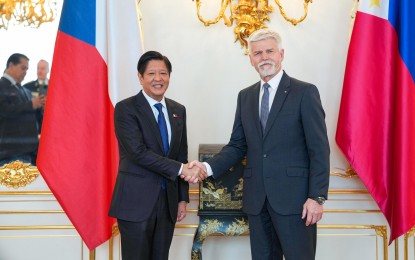From the Philippine News Agency (Mar 15, 2024): PH, Czech Republic bolster ties; agree on rules-based order in SCS (By Darryl John Esguerra)

STRONGER TIES. President Ferdinand R. Marcos Jr. (left) meets with Czech Republic President Petr Pavel at the Octagon Hall in Prague Castle on Thursday (March 14, 2024). The two leaders explored opportunities for stronger Philippine-Czech Republic trade and bilateral relations. (Presidential Communications Office photo)
MANILA – President Ferdinand R. Marcos Jr. on Thursday expressed optimism over the possible increased trade and bilateral engagement between the Philippines and the Czech Republic after a fruitful meeting with Czech President Petr Pavel.
In a joint press conference at the Octagon Hall in Prague Castle, Marcos said he had a productive meeting with his Czech counterpart, noting that they explored opportunities for future partnerships in trade and investment, agriculture, green economy and renewable energy, space and aerospace, education, tourism, defense, cybersecurity, and labor, among others.
The President said he also emphasized his government's success in pump-priming the economy and making it an “attractive destination” for Czech investments in the areas of IT-BPM, electronics, manufacturing, food and agriculture, and automotive/ EV manufacturing, among others.
“I am optimistic that we will be able to attract more Czech traders and investors to do business with the Philippines as a result of this increased engagement between our respective business sectors,” Marcos said.
He said he is also looking forward to the second meeting of the Philippines-Czech Republic Joint Committee on Economic Cooperation (JCEC) in Manila later this year.
Czech Republic backs PH in SCS
Meanwhile, the two leaders also agreed that a free and open South China Sea (SCS) is in every nation’s interest, noting the importance of the region in global trade.
“As to South China Sea, we fully support the Philippines when it comes to their entitlement to free movement of goods, and also very intense support because that’s a principle that, not only we all respect but, which also secures global and regional stability,” Pavel was quoted as saying in a statement by the Presidential Communications Office.
“And to us, South China Sea may seem to be far, far away, but if you take into account the percentage of share of world or global trade that passes through this area, any disruption of these routes would have an adverse impact on Europe, not only in the form of shortage of goods but also soaring prices, which is why we have to pay attention to this topic.”
Marcos said the country would continue to deal with the territorial row “through diplomacy and dialogue” despite China’s continued aggression in the disputed waters.
“I underscored that the Philippine position on the South China Sea remains consistent, clear, and firmly anchored on the 1982 United Nations Convention on the Law of the Sea,” he said.
He also thanked Pavel for the Czech Republic’s support as a "like-minded partner, in upholding peace, stability, and the rules-based international order."
More Filipino workers in Czech Republic
During their meeting, Marcos also mentioned the Czech Republic’s decision to increase the quota for Filipino workers entering their country starting in May 2024.
“I took note of the Czech Republic’s announcement that you have increased the quota for Filipino workers from 5,500 to almost double that from January 2024 to 10,300 per year starting in May of 2024,” the President said.
The two leaders also witnessed the signing of the Joint Communiqué on Labor Consultations Mechanism, enforcing a mechanism on the proper procedure for employing Filipino citizens in the European nation.
The Czech Republic is home to more than 7,000 Filipinos working in the processing industry, automotive, repairs and appliances, manufacturing, IT communications, real estate, health/wellness, and household service work.
Marcos is in Prague upon the invitation of Pavel to strengthen the bilateral cooperation and multilateral partnership between the Philippines and the Czech Republic.
https://www.pna.gov.ph/articles/1220869
No comments:
Post a Comment
Note: Only a member of this blog may post a comment.